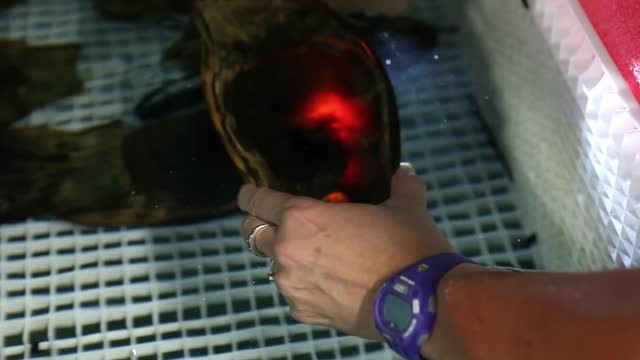Premium Only Content

VIRGIN MARY PASS: Zebra Shark At Chicago's Shedd Aquarium Had Pups Through Virgin Birth
An endangered zebra shark has had a virgin birth in which the female fertilised the eggs with her own genetic material.
The extremely rare occurrence, which is referred to as parthenogenesis, is a type of reproduction in which female animals fertilise eggs without using a male, with the young conceived asexually.
Aquarium caretaker Lise Watson and Field Museum scientist Kevin Feldheim described the incident as a "virgin birth" and said that in natural terms it was a "last-ditch" effort for an animal to reproduce in circumstances where a mate is unavailable - or, in this case, where the males that were available were rejected.
In a prepared statement, they said: "Scientists have assumed that vertebrates that usually reproduce sexually turn to parthenogenesis as a 'hail Mary pass', a last-ditch effort at reproduction when there aren't enough mates to go around."
But he added that the latest offspring were an "example of a female zebra shark in an aquarium reproducing via parthenogenesis, even though there were healthy, reproductive males in the same enclosure.
"This finding has implications for not only the continued care of zebra sharks in zoos and aquariums, but also for conservation efforts focused on their wild counterparts."
In the statement, Feldheim said: "We've known for several years that parthenogenesis occurs in animals like sharks, but some aspects of it remain unknown, like why it occurs and what triggers it."
The fact that it was a virgin birth was confirmed via genetic testing, which found that both the pups and the mother had the same genetic make-up.
The disadvantage of this form of reproduction is that there is not any genetic variation and, as such, the young tend to have shorter lives.
But in the statement, the aquarium added that their very existence "challenges long-standing ideas in biology" and can impact the conservation of all sorts of endangered species.
Feldheim added: "This discovery throws a wrench in what we thought we knew about how and why parthenogenesis happens, and it illustrates a key aspect of science: We're continually learning."
The phenomenon was used as part of the plot in the film Jurassic Park, in which only female animals were allowed to be raised in belief that this would keep populations under control.
But the idea collapsed when the female dinosaurs used parthenogenesis to reproduce anyway.
-
 11:21
11:21
TimcastIRL
1 hour agoGOP Rep Says TWO SHOOTERS In JFK Assassination As FBI Uncovers TROVE Of Secret Documents
6.49K16 -
 13:31:32
13:31:32
iViperKing
17 hours agoGood Times + Good Energy Ft. Whez.. #VKGFAM #RRR
70K15 -
 12:24
12:24
Winston Marshall
1 day agoWOAH! Bannon just Revealed THIS About MUSK - The Tech-Right vs MAGA Right Civil War Ramps Up
196K290 -
 7:33:46
7:33:46
Phyxicx
16 hours agoRaid & Rant with the FF14 Guild on Rumble! Halo Night just wrapped up! - Go Follow all these great guys please! - 2/15/2025
134K4 -
 10:42:19
10:42:19
Reolock
18 hours agoWoW Classic Hardcore (LVL 60) | RAID DAY | Rumble FIRST HC Raid
84.5K4 -
 3:10:03
3:10:03
Barry Cunningham
16 hours agoTRUMP WEEKEND BRIEFING! MORE WINNING...MORE LEFTIES LOSING IT!
63.3K37 -
 2:20:09
2:20:09
Tundra Tactical
15 hours ago $3.09 earnedIs Trumps Executive Order A Second Amendment Wishlist???: The Worlds Okayest Gun Live Stream
43.3K2 -
 2:33:51
2:33:51
John Crump Live
20 hours ago $27.37 earnedSaturday Night Main Event!
140K13 -
 13:57
13:57
TimcastIRL
1 day agoTrump NUKES IRS After DOGE Investigation, OVER 9000 Employees To Be FIRED
145K186 -
 13:35
13:35
Russell Brand
19 hours agoPFIZER JUST MADE THEIR NEXT MOVE AND EXPERTS ARE TERRIFIED
168K335